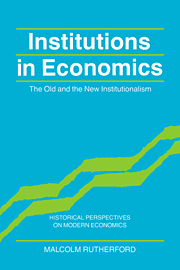4 - Rationality and rule following
Published online by Cambridge University Press: 12 January 2010
Summary
The discussion of individualism and holism in Chapter 3 touches on several points concerning the extent to which man should be conceptualized as a “rule follower,” who develops habits and routines and, more important, adopts social norms and conventions, as opposed to a rational maximizer, who adjusts his behaviour to changes in his circumstances and opportunities in such a way as to maximize his netbenefits. Just as individualism and holism have often been dichotomized, so have these two conceptions of man. In Jon Elster's (1989a: 97) words:
One of the most persistent cleavages in the social sciences is the opposition between … homo economicus and homo sociologicus. … The former adapts to changing circumstances, always on the lookout for improvements. The latter is insensitive to circumstances, sticking to the prescribed behavior even if new and apparently better options become available. The former is easily caricatured as a self-contained, asocial atom, and the latter as the mindless plaything of social forces or the passive executor of inherited standards.
Orthodox economists frequently caricature the sociological model, while attempting to argue that their own is not so naive as sometimes thought. Brunner (1987), for example, outlines what he calls the REMM model – resourceful, evaluating, maximizing man – which he associates with economics, and the sociological model of socialized, role-playing, and sanctioned man, or SRSM. Brunner and Meckling (1977: 73) claim that in the sociological model man “is neither resourceful nor an evaluator.” His behaviour is “directly determined by social factors and cultural conditions,” he is “a conformist enslaved by conventions.”
- Type
- Chapter
- Information
- Institutions in EconomicsThe Old and the New Institutionalism, pp. 51 - 80Publisher: Cambridge University PressPrint publication year: 1994

